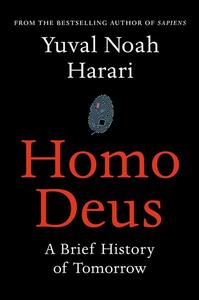Take a photo of a barcode or cover
informative
slow-paced
informative
slow-paced
dark
funny
informative
reflective
tense
slow-paced
challenging
informative
medium-paced
Ein wirklich ganz aufschlussreiches Buch über die Menschheit. Nur am Ende wiederholen sich die Argumente ein bisschen.
Well, wow. Herari has done it again. While I preferred Sapiens due to its clearly chronological progression, Homo Deus raises questions I never would have considered on my own. My conception of humanity and of the future of the world will never be the same again. Bravo.
If and when any of my friends read this book I'd like to talk about it with you. There is a lot to unpack in this book, and a lot that I'd like to argue with. I need an online book club or something.
This book was incredibly uncomfortable and scary. I can't really say that I enjoyed it or that I am glad I read it, which is unusual for me. I generally enjoy books that make me uncomfortable and challenge my worldview, but then usually I feel empowered to change myself and influence the world around me. But in this case the possible futures that Homo Deus presents make me feel both fearful AND utterly powerless.
The one comfort I have is that it's possible that people from the 1800's would look at our reality and only see people glued to tiny screens and feel the same horror that I feel now, and yet they would be missing all of the good in the modern world, plus the fact that many or most of us live happy, fulfilling lives, or at least have the opportunity to do so. But as much as I worry about the problems of the poor and disenfranchised of today's world, I can only see them complely left behind to (what looks like to me) a Homo Deus distopia while the rich live perfect lives.
Harari talks a lot about how many people will find the topics presented in the book frightening, and he's right, I did and do.
One of my takeaways from the book is that it may be a mistake to judge the future with my present set of values, but of course I do anyway. I'm not clever or creative enough to do otherwise.
I do have one major criticism: Harari often makes bold claims based on extreme oversimplification of enormously complicated topics. The one I remember in particular went something like this:
"Poor country X was focused on God and religion instead of steam technology so they were left behind in the Industrial Revolution."
Sure, maybe that was a contributing factor, but world history is extremely complicated and that's not the only reason. The truth resists simplicity.
This book was incredibly uncomfortable and scary. I can't really say that I enjoyed it or that I am glad I read it, which is unusual for me. I generally enjoy books that make me uncomfortable and challenge my worldview, but then usually I feel empowered to change myself and influence the world around me. But in this case the possible futures that Homo Deus presents make me feel both fearful AND utterly powerless.
The one comfort I have is that it's possible that people from the 1800's would look at our reality and only see people glued to tiny screens and feel the same horror that I feel now, and yet they would be missing all of the good in the modern world, plus the fact that many or most of us live happy, fulfilling lives, or at least have the opportunity to do so. But as much as I worry about the problems of the poor and disenfranchised of today's world, I can only see them complely left behind to (what looks like to me) a Homo Deus distopia while the rich live perfect lives.
Harari talks a lot about how many people will find the topics presented in the book frightening, and he's right, I did and do.
One of my takeaways from the book is that it may be a mistake to judge the future with my present set of values, but of course I do anyway. I'm not clever or creative enough to do otherwise.
I do have one major criticism: Harari often makes bold claims based on extreme oversimplification of enormously complicated topics. The one I remember in particular went something like this:
"Poor country X was focused on God and religion instead of steam technology so they were left behind in the Industrial Revolution."
Sure, maybe that was a contributing factor, but world history is extremely complicated and that's not the only reason. The truth resists simplicity.
Dispassionate but compelling analysis of where our culture is going, with Dataism replacing humanism.
His first book was an amazing exercise of critical review, providing a powerful insight about western history. Although sometimes flawed and pop-like it was a powerful essay.
But this book is just the uncovering of the secret goal of Sapiens: transhumanist ideology (aka Fascism 2.0.)
Mandness ungrounded.
But this book is just the uncovering of the secret goal of Sapiens: transhumanist ideology (aka Fascism 2.0.)
Mandness ungrounded.
Good book, the main difference between Homo Sapiens and Homo Deus is the perspective, while the first is based on past it relies heavily on facts, the second one tries to be more predictive in our options for the future, and uses a lot of hypothetical guesses. The book analyzes different religions (money, Christianism, communism, liberalism...) from a philosophical perspective. Homo Deus also grabs some concepts from the last book, mainly the concept of mythological entities.
Great book for anyone who already thought about what humans will revere after money.
Great book for anyone who already thought about what humans will revere after money.



